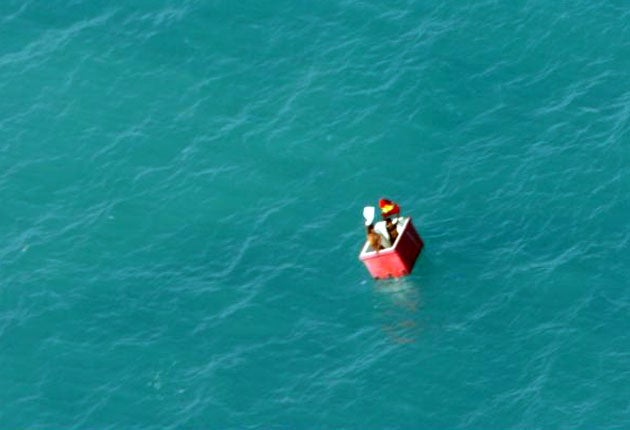Alone on a wide, wide sea, two men saved by an ice box
Fishermen were adrift in cool-box for 25 days after boat sank off Australia

Two Burmese fishermen found floating in a cool-box in shark-infested waters off Australia claim to have spent 25 days adrift after their boat sank. Their first words on being rescued were, "Could we have a drink?"
The men, said to be ravenous and desperate, gulped down four pints of water each within moments of being plucked to safety by an emergency helicopter. They had been spotted during a routine patrol by a customs service aircraft, which saw them standing in the industrial-sized cooler, a waist-high container not much bigger than a bathtub, frantically waving.
The fishermen told Australian authorities they had managed to clamber into the red cool-box after their 30ft wooden boat, which had set off from Thailand, went down in heavy seas on 23 December. The other 18 members of the mixed Thai-Burmese crew are presumed to have drowned.
It was not immediately clear yesterday how the pair survived, but, according to some reports, they ate chunks of fish stored in the cooler and drank rainwater that gathered on the floor. The Australian Maritime Safety Authority said that it had no reason to doubt their account of events.
The two men, aged 22 and 24, were picked up in the Torres Strait, between northern Australia and Papua New Guinea, and flown 70 miles to the nearest hospital on Thursday Island, off Queensland. They were discharged yesterday after being treated for dehydration and skin complaints, and are in a motel while immigration authorities try to establish their identities. During their nearly month-long ordeal, the Burmese are believed to have endured searing heat, as well as high winds and torrential rain whipped up by Cyclone Charlotte.
The helicopter pilot, Terry Gadenne, said he was astonished they had survived, with the cyclone active in the nearby Gulf of Carpentaria. "The week before [the rescue] was really rough, strong winds feeding into the cyclone in the gulf, and a lot of heavy rain," he told local radio. "It was a really hot time, and if they were in the sun, they would have been in dire straits. They were dehydrated, there's no doubt about it, and very keen to get out. I think they were fairly desperate. They put down two litres of water really quickly each."
But the cyclone may have been the men's salvation, bringing the monsoon rains that stopped them dying of thirst. The helicopter was looking for much larger vessels, illegal trawlers and boats carrying would-be asylum-seekers, when it noticed the pair, bare-chested and waving their T-shirts. The maritime safety authority's spokeswoman, Tracey Jiggins, said: "They had no safety equipment, no beacons, no means of communication. For them to have even been spotted in a huge body of water is amazing."
An Australian cool-box manufacturer, Techni Ice, said the cooler appeared to be one of its 210-gallon models, manufactured in Thailand and used by commercial fishing boats. Its director, Graeme Reberger, said: "I'm just surprised that they were able to stay in it without it tipping over."
Details of when the boat set off from Thailand and why it sank remain sketchy, although the two men have reportedly said that it had been taking in water for days. They have also described seeing other crew members in the water without lifejackets or flotation devices. Australian authorities said it would be futile to mount a search, more than three weeks later.
Days adrift
5 After capsizing in the Southern Ocean while taking part in the Vendée Globe, a solo round-the-world race, in 1997, British sailor Tony Bullimore managed to stay alive for five days crouched in his yacht's hull. After he was rescued by the Australian Navy, Bullimore said he survived on "chocolate, water and determination".
6 Troy Driscoll and Josh Long, 15 and 17 respectively, from South Carolina spent six days without food or water in 2005 after their sailboat was caught in a riptide that took them out to sea. They were rescued more than 100 miles from where they set off.
Subscribe to Independent Premium to bookmark this article
Want to bookmark your favourite articles and stories to read or reference later? Start your Independent Premium subscription today.

Join our commenting forum
Join thought-provoking conversations, follow other Independent readers and see their replies